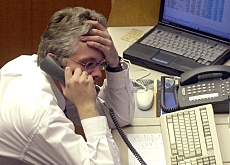
Workers run risk of burnout

Workers are increasingly at risk of burnout - physical or mental collapse, caused by overwork or stress – speakers at a health conference have warned.
Thursday’s conference in Fribourg in western Switzerland heard that teachers, health workers and call centre workers were most at risk.
Special training is needed in the workplace to make people aware of the symptoms of burnout, Peter Richter, professor of work and organisational psychology at Dresden University and a key speaker at the conference told swissinfo.
“One of the main causes of burnout is a loss of reciprocity in social interactions. In other words, we have to give much more than we get back,” Richter said.
This is particularly evident in places like call centres, with low autonomy, low task variety and limited decision-making latitude, he explained.
“Freelancers are also in danger because they have no job security and have to operate in precarious work situations with little social support from managers or colleagues.”
The trend towards more freelance and contract working increases the risk of emotional exhaustion, Richter warned.
“Burnout is prevalent at all levels of the professional hierarchy from low status positions, such as call centre workers, to teachers, those in the social or medical fields and middle management in general,” Richter added.
Cost of stress
Apart from the personal cost to the individual, burnout is also a financial burden on companies and the state. Currently one in 20 people of working age in Switzerland is receiving invalidity insurance.
In 2004 one-third of all benefits paid out related to mental-health claims and work-related stress, and 40 per cent of all new recipients belonged to this category.
The conference, which was organised by the State Secretariat for Economic Affairs (Seco) and Health Promotion Switzerland, focused on detection and prevention.
“It is important to develop a secure workplace and to organise work so that colleagues have autonomy and variety,” Richter advises.
A positive social support system also plays a key role in avoiding stress, as does an effective reward system for workers’ efforts.
Detrimental conditions
The term burnout first emerged in the United States and is now well recognised in Europe. Hans Kernen, psychologist and consultant, told swissinfo that it was a proven fact that psychological stress in the workplace was growing.
Burnout can be seen either as an inability on the part of the individual to meet the demands of work or as a consequence of a detrimental organisational system and work conditions.
“Both factors are interlinked but the work conditions are the more essential cause,” Kernen said.
“Symptoms of burnout include emotional exhaustion. This manifests itself in lack of energy, a feeling of emptiness, needing to stress oneself more and more to participate in the work environment and an inability to relax properly,” Kernen explained.
People suffering from the condition also withdraw from the social side of the work, avoiding contact with colleagues and becoming isolated. They also believe that they are underperforming, even when it is not objectively true.
Experts agree that there is plenty that companies can do to reduce the risk of burnout in their staff. Above all, tasks and working conditions should be adapted to the abilities of employees.
The National Conference for the Promotion of Health in the Workplace takes place in the University of Fribourg on Thursday, March 9.
One of the key themes of the conference is the detection and prevention of burnout among employees. Almost one in five managers are at risk of burnout.
In a recent survey, more than one third of Swiss workers said they were either stressed or very stressed, with young people among the most affected.
A study by the State Secretariat for Economic Affairs (Seco) found that stress cost Switzerland an estimated SFr4.2 billion ($3.2 billion) annually.

In compliance with the JTI standards
More: SWI swissinfo.ch certified by the Journalism Trust Initiative






























You can find an overview of ongoing debates with our journalists here . Please join us!
If you want to start a conversation about a topic raised in this article or want to report factual errors, email us at english@swissinfo.ch.